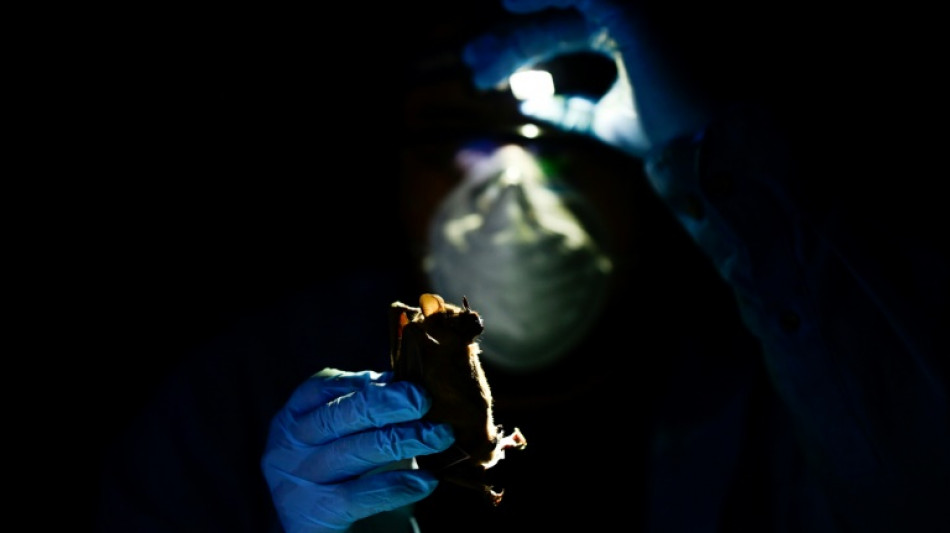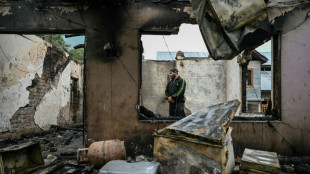
-
 India says repulsed fresh Pakistan attacks as death toll climbs
India says repulsed fresh Pakistan attacks as death toll climbs
-
Japan's Panasonic targets 10,000 job cuts worldwide

-
 Putin evokes WWII victory to rally Russia behind Ukraine offensive
Putin evokes WWII victory to rally Russia behind Ukraine offensive
-
China exports beat forecasts ahead of US tariff talks

-
 Leo XIV, the 'Latin Yankee', to celebrate first mass as pope
Leo XIV, the 'Latin Yankee', to celebrate first mass as pope
-
Most stocks lifted by hopes for US-China talks after UK deal

-
 IPL suspended indefinitely over India-Pakistan conflict: reports
IPL suspended indefinitely over India-Pakistan conflict: reports
-
German lender Commerzbank's profits jump as it fends off UniCredit

-
 Rare bone-eroding disease ruining lives in Kenya's poorest county
Rare bone-eroding disease ruining lives in Kenya's poorest county
-
India says repulsed fresh Pakistan attacks as de-escalation efforts grow

-
 Zhao's historic snooker title sparks talk of China world domination
Zhao's historic snooker title sparks talk of China world domination
-
'High expectations': EU looks to Merz for boost in tough times

-
 Poisoned guests rarely invited before deadly mushroom lunch, Australia trial hears
Poisoned guests rarely invited before deadly mushroom lunch, Australia trial hears
-
China sales to US slump even as exports beat forecasts

-
 Indian cricket to make 'final decision' on IPL over Pakistan conflict
Indian cricket to make 'final decision' on IPL over Pakistan conflict
-
Dethroned Bundesliga champions Leverkusen face uncertain future

-
 China can play hardball at looming trade talks with US: analysts
China can play hardball at looming trade talks with US: analysts
-
French monuments in trouble while PSG prepare for Champions League final

-
 Newcastle face Chelsea in top five showdown, Alexander-Arnold in spotlight
Newcastle face Chelsea in top five showdown, Alexander-Arnold in spotlight
-
Flick's Barca must show 'hunger' in crunch Liga Clasico

-
 Clasico the last chance saloon for Ancelotti's Real Madrid
Clasico the last chance saloon for Ancelotti's Real Madrid
-
Timberwolves overpower Warriors to level series

-
 Chinese fabric exporters anxious for US trade patch-up
Chinese fabric exporters anxious for US trade patch-up
-
Putin gears up to host world leaders at lavish army parade

-
 Nearing 100, Malaysian ex-PM Mahathir blasts 'old world' Trump
Nearing 100, Malaysian ex-PM Mahathir blasts 'old world' Trump
-
Leo XIV, first US pope, to celebrate first mass as pontiff

-
 Asian stocks lifted by hopes for US-China talks after UK deal
Asian stocks lifted by hopes for US-China talks after UK deal
-
Former head of crypto platform Celsius sentenced 12 years

-
 Ex-model testifies in NY court that Weinstein assaulted her at 16
Ex-model testifies in NY court that Weinstein assaulted her at 16
-
Nestlé and OMP Showcase Approach to Future-Ready Supply Chain at Gartner Supply Chain Symposium/Xpo in Barcelona

-
 Genflow Biosciences PLC Announces Share Subscription, Director's Dealing and Update
Genflow Biosciences PLC Announces Share Subscription, Director's Dealing and Update
-
Argo Blockchain PLC Announces 2024 Annual Results and Restoration of Listing

-
 'Great honor': world leaders welcome first US pope
'Great honor': world leaders welcome first US pope
-
Pacquiao to un-retire and fight Barrios for welterweight title: report

-
 Trump unveils UK trade deal, first since tariff blitz
Trump unveils UK trade deal, first since tariff blitz
-
Man Utd one step away from Europa League glory despite horror season

-
 Jeeno shines on greens to grab LPGA lead at Liberty National
Jeeno shines on greens to grab LPGA lead at Liberty National
-
Mitchell fires PGA career-low 61 to grab Truist lead

-
 AI tool uses selfies to predict biological age and cancer survival
AI tool uses selfies to predict biological age and cancer survival
-
Extremely online new pope unafraid to talk politics

-
 Postecoglou hits back as Spurs reach Europa League final
Postecoglou hits back as Spurs reach Europa League final
-
Chelsea ease into Conference League final against Betis

-
 Pope Leo XIV: Soft-spoken American spent decades amid poor in Peru
Pope Leo XIV: Soft-spoken American spent decades amid poor in Peru
-
First US pope shared articles critical of Trump, Vance

-
 'Inexcusable' - NBA champs Boston in trouble after letting big leads slip
'Inexcusable' - NBA champs Boston in trouble after letting big leads slip
-
US automakers blast Trump's UK trade deal

-
 Stocks mostly rise as US-UK unveil trade deal
Stocks mostly rise as US-UK unveil trade deal
-
Trump presses Russia for unconditional 30-day Ukraine ceasefire

-
 Anything but Europa League glory 'means nothing' for Man Utd: Amorim
Anything but Europa League glory 'means nothing' for Man Utd: Amorim
-
'Inexcuseable' - NBA champs Boston in trouble after letting big leads slip


In Mexican jungle, scientists prepare for future pandemics
As night fell in Mexico's Yucatan jungle, veterinarian Omar Garcia extracted blood and fluids from a bat as part of an investigation aimed at preventing the next potential pandemic.
The goal of the Franco-Mexican project is to detect diseases -- known as zoonoses -- transmitted from animals to humans in tropical climates.
Bats are under scrutiny from the international scientific community as a possible source of coronavirus transmission.
The winged mammal remained immobile while bearing its fangs, before being released by Garcia, a vector-borne disease expert.
Scientists from France's Research Institute for Development (IRD) and the National Autonomous University of Mexico (UNAM) have been collaborating in the study since 2017, using a modern laboratory in Merida, the Yucatan state capital.
The aim is to discover how different viruses that circulate between animals such as mammals, birds and rodents, can potentially pass to humans, said Audrey Arnal, an infectious diseases expert at the IRD.
"This is zoonosis... understanding what the consequences of human contact with wildlife could be and then understanding what could be the next epidemic that can come out of nature," she told AFP.
Scientists take samples of all kinds of animals from the rich ecosystem of the tropical rainforest, where they have identified 61 species of mosquitoes.
"We have many questions" to try to "complete the history of the transmission cycle" of viruses, said UNAM biologist Maria Jose Tolsa, who after a decade of research finally feels that the importance of her work is recognized.
"A pandemic has serious consequences for health and the economy," she said.
- High-risk zone -
The area was chosen for the research because rapid deforestation has made it "a highly emblematic region in terms of zoonosis emergency risks," said Benjamin Roche, a specialist in ecology and evolutionary biology at the IRD.
It is estimated that between 500,000 and 800,000 viruses could affect humans, he added.
The risks grow with the expansion of agriculture and tourism, which increase contact between animals and humans, according to researchers.
Thousands of trees have been felled in the Yucatan Peninsula to build President Andres Manuel Lopez Obrador's flagship tourist rail project, the Mayan Train, scheduled to start operating in December.
The government says that it is offsetting the loss with a tree-planting program and the creation of the second-largest tropical rainforest reserve in the world after the Amazon.
The key is to achieve a balance between humans and nature, Arnal said.
"The population have to live, eat and develop their economy," she added.
The research is being carried out in 12 communities across the three states that make up the Yucatan Peninsula.
"In birds we've found species that have been identified as reservoirs for the West Nile virus or influenza," said Rosa Elena Sarmiento, from the virology laboratory of the UNAM Veterinary School.
- 'Great revealer' -
Field work begins at dawn by placing a dozen fine nets to trap birds. At dusk it is the turn of bats and even owls.
Once caught, blood, fluid and ectoparasite samples -- if they carry them -- are taken.
Scientists identify the animal, measure it, record the data and check its condition before releasing it.
Later the material is analyzed in the laboratory.
"DNA is a great revealer," Arnal said.
"With the blood of the mosquito we can determine which species or which animal was bitten," she added.
Blood samples will also be taken from local residents to determine if they carry any virus that came from an animal.
The project also includes consultations with communities to learn about their environmental and social problems, and encourage forms of coexistence with nature.
"There has to be a knowledge dialogue with the communities," said Erika Marce Santos, a member of the Mexican Association of Conservation Medicine who liaises with residents.
The Merida laboratory is connected with others in Africa, South Asia and other Latin American countries within the framework of an initiative called Preventing Zoonotic Disease Emergence.
Launched by France in 2022, it brings together 22 countries and 200 organizations.
"What we're looking for in the Yucatan is to devise a prevention strategy against zoonoses that can serve as an example to the whole world," Roche said.
P.Martin--AMWN

